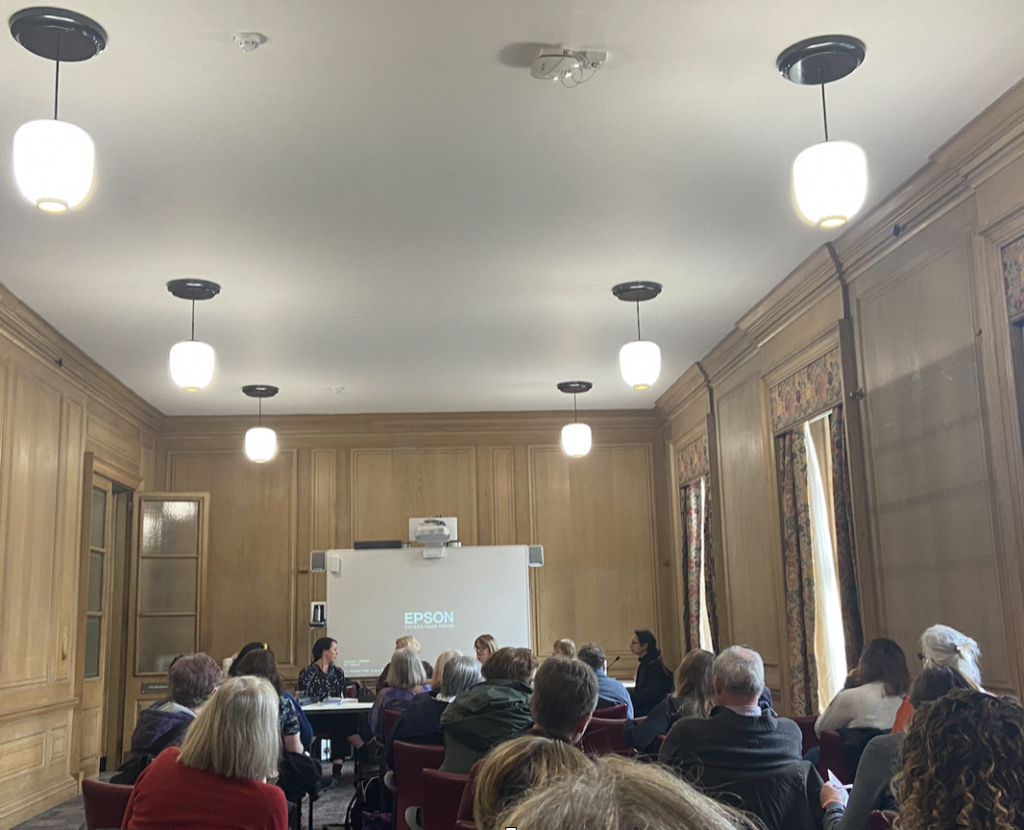
By Emma Williams, Bristol Women’s Voice volunteer
On Saturday 5th March 2022, Bristol Women’s Voice celebrated International Women’s Day at Bristol City Hall, welcoming more than 25 events for Bristol women to participate in and a variety of Bristol organisations to showcase their work in the main hall.
The day was a chance to celebrate organisations in Bristol working to create powerful opportunities for women striving for justice and equality in an ever-changing and diversifying city. The attendance and interest in the day correlates with the messages of Bristol Women’s Voice’s campaign for the involvement and empowerment of the Bristol Women in societal change of the city.
As part of the day’s efforts to empower the voices of Bristol women, the Bristol Mayoral Referendum panel that took place in collaboration with Bristol Ideas provided an opportunistic space for the panel to discuss the importance of the upcoming mayoral referendum in May 2022.
This reflective blog is written with the intention of highlighting the key messages that were discussed about the upcoming referendum and how this may impact Bristol when any change would come into effect at the end of the current Mayoral term in 2024.
It is important to allow Bristol women to have a stronger and more informed voice when voting and International Women’s Day provided a safe and empowering space for women to ask how the current political and social change will impact the future voices of Bristol women.
Key messages from the panel discussion
Cllr Emma Edwards (Green Party – Bishopston and Ashley Down Ward)
- Supporting the change to a decision-making system by councillors to allow a democratic reformist system regarding policy making for the city.
- Plenty of cities in the UK have effective leadership with council and so a more democratic system instead of a mayor leadership as any policy change are made by members at conference, emphasising the process of the democratic community system for Bristol.
- City mayor and the Cabinet will have large amounts of policy debate in council community system in a transparent way – allowing any decision-making process for the city to be democratic.
- Debate is important as it is significant when shaping the city, whilst also encouraging public engagement in these debates as this is what will have detrimental effects on societal development.
- Need to redefine the role of the council, emphasis on public engagement as this enables a wider community representation in future policies for Bristol.
Cllr Jos Clark (Lord Mayor of Liberal Democrats – Brislington West Ward)
- Also in favour of the return to decision-making by councillors from an outward community system, meaning different to cabinet and leader and it was her group who brought the idea of return to Bristol City Council.
- It would be righteous to give people the democratic conversation after 10 years.
- Highlights the often misconception of roles and tasks of mayor in Bristol by the public, thus reinforcing the need to reform to a more democratic system.
- Identifies the roles of WECA mayor (transport and business), Mayor of Bristol who is the directly elected mayor, and Lord Mayor (carries out ceremonial duties and chairs meetings).
- Not in favour of current mayoral system due to the governance of the city- instead convert to democratic process of council, move to community, where 70 people taking a view; replacing the current deficient placement of a great extent of power being seeded in an individual.
- Structural problem within the whole current system, requiring more engagement with the city, councillors will represent the communities in Bristol.
Cllr Nicola Beech (Cabinet Member for Labour with responsibility for Climate, Ecology, Waste and Energy – St George Central Ward)
- Pro and in support to retain the position of directly elected mayor, recognises that the mayor has had an unprecedented role of outlining the cities success.
- Council collaboration outward look is important for the role of the mayor- involvement in global collaborative discussions, for example, Global Mayor Migration Council and COP26, changes the significance of identity of cities; this being possible with sustaining a strong leadership figure.
- Believes that councils themselves have a shrinking role to play in the decision-making of policies for societal change.
- Reform is needed, role of council is not up to date now, not needed- forward looking position constitutional form for collaboration to close the gap of deprivation.
Estella Tincknell (Former Labour councillor for Lockleaze)
- Maintaining the current mayoral system as it has only been 10 years of mayor in Bristol, the progress of minimising structural problems and segregation needs the continuation of mayor leadership. Instead of radically shifting to community council leadership.
- Arguing that councils spend too much of their time doing unneeded visits to the minor part of the whole societal system, whereas strong leadership with elector mayoral roles ensure a balanced outward and inward omniscient view for development in Bristol.
- Councillor roles need to be redefined.
- Identifies that ageing population and climate change are the biggest issues facing Bristol, changing the political and leadership profile for Bristol would be too soon.
Jaya Chakrabarti MBE (Social entrepreneur and community activist)
- In favour to campaign for mayoral election as keeps a figure that is identifiable to voice the city’s development with pride and establishes a clear authoritative direction for Bristol policies that impact the economic, social, and environmental future of Bristol.
- 10 years’ worth of development built in the city in the hardest global and national times involving Brexit and the pandemic. Therefore, if there is a reformist decision-making system by councillors, fear of not having someone outward looking and strong leadership, could start to lose confidence in the city progress in policy identity.
- Many good things that the mayor has achieved, four-year elections are happening now due to the leadership as “strong leadership matters”.

